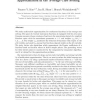22 search results - page 1 / 5 » Worst-Case to Average-Case Reductions Based on Gaussian Meas... |
FOCS
2004
IEEE
13 years 8 months ago
2004
IEEE
We show that finding small solutions to random modular linear equations is at least as hard as approximating several lattice problems in the worst case within a factor almost line...
APPROX
2007
Springer
13 years 10 months ago
2007
Springer
Abstract. A fundamental goal of computational complexity (and foundations of cryptography) is to find a polynomial-time samplable distribution (e.g., the uniform distribution) and...
FOCS
2003
IEEE
13 years 9 months ago
2003
IEEE
We show that if an NP-complete problem has a non-adaptive self-corrector with respect to a samplable distribution then coNP is contained in NP/poly and the polynomial hierarchy co...
JC
2008
13 years 4 months ago
2008
We study multivariate approximation for continuous functions in the average case setting. The space of d variate continuous functions is equipped with the zero mean Gaussian measu...
STACS
1999
Springer
13 years 8 months ago
1999
Springer
Abstract. We advocate to analyze the average complexity of learning problems. An appropriate framework for this purpose is introduced. Based on it we consider the problem of learni...

